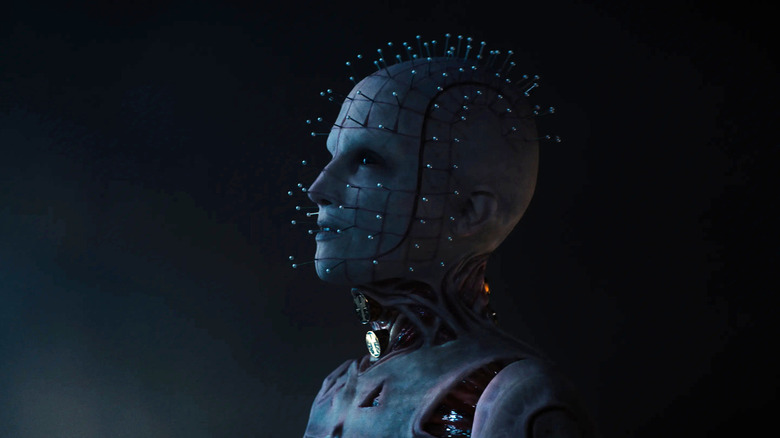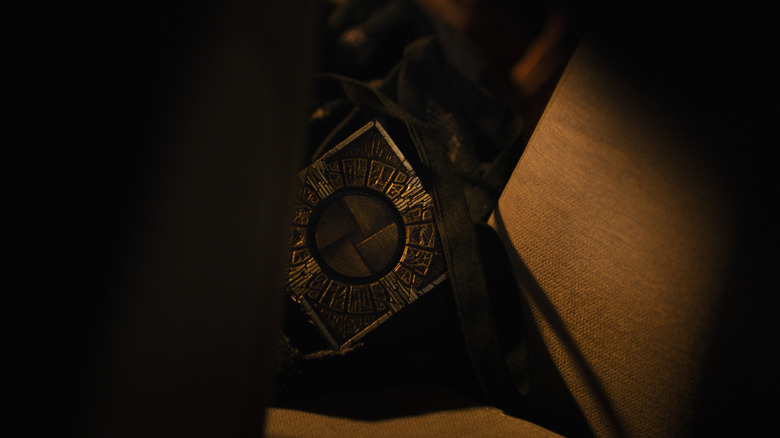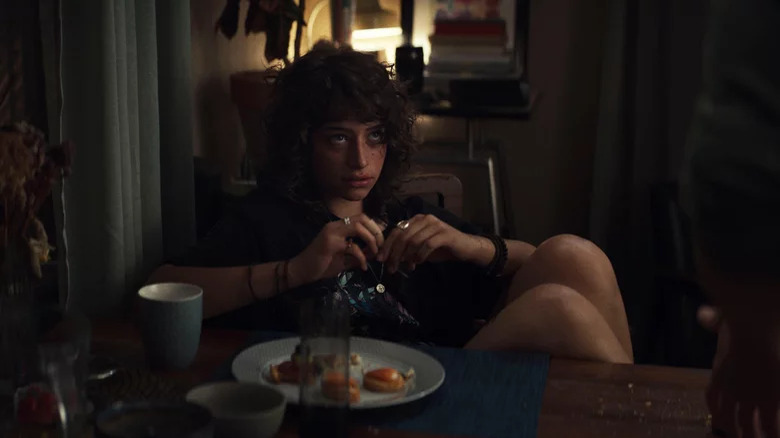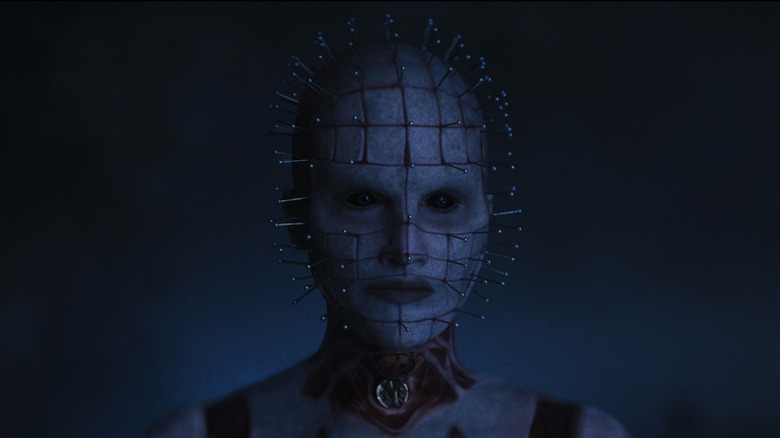Hellraiser Director And Star Explain The Reboot's Ending And What The Characters Do Next [Exclusive Interview]
"Hellraiser" is back to bring you all the pain and pleasure you've been missing. Director David Bruckner's reboot "lifts the series out of the gutter to give it a touch of old-school charm," as Chris Evangelista wrote in his review for /Film. The movie follows brand new characters, including a brand new version of the iconic Pinhead character, and a whole lot of carnage.
The film works wonderfully as a first introduction to the world created by Clive Barker in the '80s, telling you just enough about the Cenobites without diving into the convoluted mythology of the ten-film franchise, all while still having plenty of references for fans.
Following the film's world premiere at Fantastic Fest, /Film has the chance to talk to have a spoiler-filled conversation with filmmaker David Bruckner and star Jamie Clayton about the ending of "Hellraiser," what the hell the main characters do after the carnage they experienced, whether they made the right choice, and more.
'He's finally one of us'
First of all, I'm curious what you think happens right after the end of the movie? How do they even explain their injuries when there's no physical bodies or any culprit to explain things?
Bruckner: I have such a disappointing answer to this: I don't think about it. One of the things I love about movies as opposed to TV is they have endings and that you can step away from a film and regard it as an object, as an idea in total. And so it's a conversation with the audience and the end of this film is a counterpoint. Riley makes one decision and Voight makes another. And they end up in opposite perspectives having two completely different experiences. We wanted to capture the irony of that and ask the audience, who are you? Which direction would you go? What would you choose?
Clayton: Well, the only thing — I've thought about Voight, Goran's character, and the only thing that I've thought is that in finally ascending to this decision that he's made, is that he's finally released of all of this questioning and anguish and all the bulls*** that he's put himself through. He's finally released of all that now and we've given him the gift and he understands, "Oh, okay." And he's finally reveling in all of the pleasure because in my head, everything's gone. I've only thought about Voight and that he's finally one of us.
Bruckner: It's all in that exhale, in the final shot.
So you think he goes full Cenobite at the end? He fully embraces the idea of it?
Clayton: Yeah, where we move right along to the next person to find the box. Yeah.
'No, don't pick that one'
Why do the Cenobites grant both Riley and Voight's requests at the end?
Bruckner: Oh, well the Cenobites love to take people on a journey. So they are quite literally there to offer gifts. These are experiences that they value and enjoy. They represent the extremity of human pursuits in many different forms. And we may find them horrifying, but they're sincere in their offerings. And so, the Priest means it when she says, "If you're not happy Voight, let us address your displeasure." So there's an eagerness to work with us, I would say. They're not resistant to fulfill our desires.
Does Riley make the right choice at the end? Was a better outcome possible?
Bruckner: Well, was it the best possible choice for Riley? I'm on the fence personally as an audience member of this film. I think in some ways it was the choice that she needed to make. But I do think that the Cenobites have something truly magical on offer, and if you dare to pull back the veil on the universe and take a peek, you can have that. So it's a question that we offer and I think you can really feel in Jamie's performance in those final moments, the disappointment that she has because of all the majesty that Riley will miss because of the very responsible decision that she has made.
Clayton: I mean, yeah, as an audience member, I'm so proud of the Riley character for realizing that her choices do have consequences and that this is her fault. Her brother is gone because of her. And you can't keep going. You can't. But as the Priest, [I say] "F***ing idiots. Are you f***ing kidding me? Oh my God, what the f*** is wrong with you? No, don't pick that one."
Would the resurrection have actually worked? Or was it a trick?
Bruckner: There's an image in the basement. She has a premonition of what it will be. The resurrection choice does harken back to Frank in the original film. Like all gifts the Cenobites give, it will be miraculous but perhaps terrifying, perhaps an aberration in one way or another from our perspective. It's a tough call.
'You need to see the depression of the skin'
Can you talk about the practical effects in the film, particularly the death of Aoife Hinds' Nora with the throat stabbing?
Clayton: The scene that you're speaking of with the pin in the throat, the actress Aoife Hinds, she's incredible. And she was up in a rig with hooks in prosthetic makeup and they were coming in and putting blood between the takes. They built that hallway, that extension of the van that we were in. And there was dirt on the ground and those bricks were there and there were chains that were suspended by my head. And I do go and pull a pin and then it is switched with the long one. And then I do go and I poke her with it because she told me to.
Bruckner: I didn't know that.
Clayton: You need to see the depression of the skin. I was like, "Can I do this to you?" And she was like, "Yes, do it darling." So I would poke her with it. Even reading it on the page and the lines, there's no music and as I'm turning, we're there, and David said, "You're going to be turning the pin as if you're conducting her screams and adjusting the pitch and the volume of her screams." And so in my mind I'm like, "Okay, cool, cool, whatever." And I'm doing it and then I see it and I'm like, "Oh f***, that is so f***ing cool."
Bruckner: One of the things we really wanted to achieve, I think in any of the chain sequences, really, was to have torque in the poles. Typically when you rig an actor up and you attach chains to them, they can't be real chains, they can't be the weight of metal, necessarily. But we really wanted the body to move and conduct and respond. And so we had to design a chain system that you could attach to a harness underneath that could play as a practical chain on camera, but was also a kind of resin mold.
We designed our own chains that you could pull and maneuver. An actor could support real weight. So moments like that with Aoife, moments with Joey in the beginning, moments with Voight later on, and even some degree with Colin, all of those — that's practical stuff at work. What you see in the movie is really there on set. Anytime we were interacting with Cenobite devices and actors, that was the most challenging.
Is there a specific scene you want people to pay close attention to in regards to references or easter eggs?
Bruckner: One of my favorites is that there is some direct sexual references to how the Box is handled in the original film by Frank before he's taken by the Cenobites. And we did nod to that from Riley's perspective. So there's some interaction that she has with the Box that feels like an appropriate counterpoint to that.
"Hellraiser" is streaming now on Hulu.



